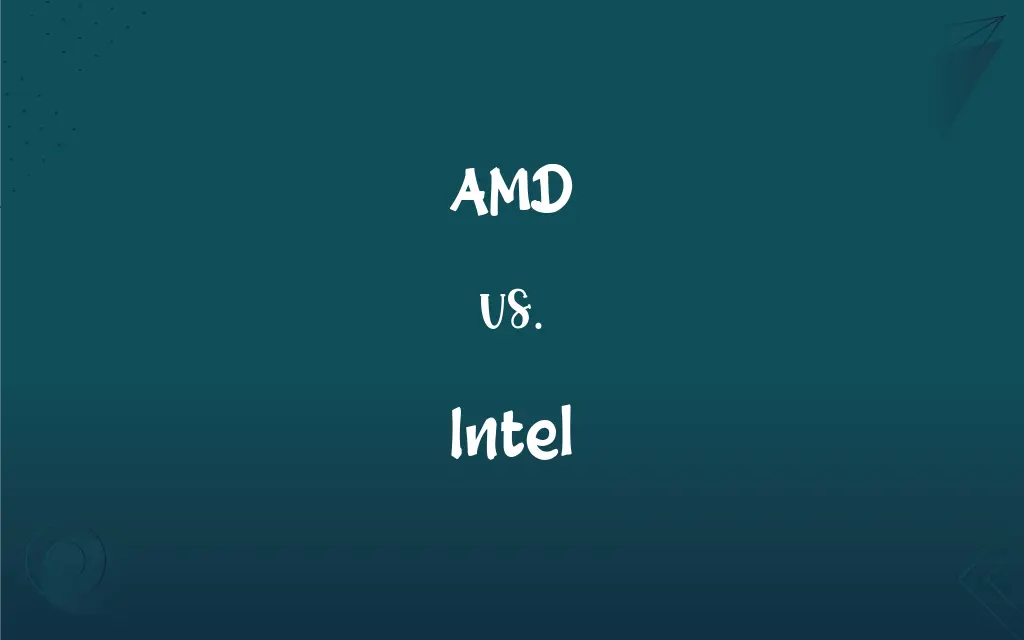AMD vs. Intel: What's the Difference?
Edited by Aimie Carlson || By Janet White || Published on March 4, 2024
AMD and Intel are leading semiconductor companies, with AMD known for value and performance, and Intel for technological innovation and market presence.

Key Differences
AMD and Intel are two of the biggest names in the computing world, primarily known for their processors. AMD, or Advanced Micro Devices, has gained a reputation for providing high-performance CPUs and GPUs at competitive prices, making it a favorite among gamers and budget-conscious consumers. Intel, on the other hand, is renowned for its technological innovation, leading performance in high-end computing markets, and extensive product lineup that includes CPUs for a wide range of devices from servers to personal computers.
Intel has historically dominated the CPU market, especially in laptops and desktops, offering processors that are known for their high efficiency and strong single-threaded performance. This dominance has been challenged by AMD's Ryzen series, which offers comparable or superior multi-threaded performance and better value for money. Intel's processors are often found in a broad array of computing devices, reflecting the company's large market share and long-standing relationships with computer manufacturers.
AMD's architecture, particularly with its Zen series, has been pivotal in the company's resurgence as a competitive force against Intel. AMD has focused on increasing core counts and improving energy efficiency, which has appealed to both the consumer and enterprise markets. Intel, while initially slow to respond to AMD's increased core counts, has continued to innovate in areas such as integrated graphics and AI acceleration technologies.
Both AMD and Intel are pushing forward with new technologies such as 7nm and 10nm manufacturing processes, respectively, though each company follows a different naming convention that doesn't directly translate to the physical size of transistors. This technological race impacts not only the performance and efficiency of processors but also the broader technology ecosystem, influencing trends in computing, gaming, and artificial intelligence.
Choosing between AMD and Intel often comes down to specific needs and budgets. AMD might offer a better price-to-performance ratio for high-end gaming and content creation, while Intel's offerings are typically preferred in scenarios requiring maximum single-threaded performance or where specific Intel-only features are needed. Both companies continue to innovate, ensuring that the rivalry remains beneficial for consumers by driving technological advancements and keeping prices competitive.
ADVERTISEMENT
Comparison Chart
Market Position
Value and performance
Technological innovation, market presence
Product Strength
High core counts, price-to-performance
Single-threaded performance, power efficiency
Technology
Leading in multi-threaded tasks, integrated GPUs
Advanced in process technology, AI acceleration
Target Audience
Gamers, content creators
Broad consumer base, enterprise solutions
Innovation
Zen architecture, competitive GPU offerings
Optane memory, Thunderbolt integration
ADVERTISEMENT
AMD and Intel Definitions
AMD
AMD processors are popular among gamers and content creators.
My content creation workflow has greatly improved since switching to an AMD processor.
Intel
Intel holds a significant share of the CPU market, especially in laptops and desktops.
Most corporate laptops are equipped with Intel processors due to their reliability.
AMD
AMD is a leading semiconductor company known for its CPUs and GPUs.
AMD's latest processor offers exceptional gaming performance.
Intel
Intel offers a wide range of computing products, from processors to security solutions.
Intel's product lineup caters to a broad spectrum of computing needs, from servers to personal devices.
AMD
AMD challenges the market dominance of its competitors with high-performing products.
AMD has been gaining market share with its latest series of processors.
Intel
Intel is preferred for enterprise computing solutions, offering reliability and performance.
Our company's data centers rely on Intel CPUs for their critical operations.
AMD
AMD offers competitive price-to-performance ratios in its processors.
For my new gaming PC, I chose an AMD CPU to get the most bang for my buck.
Intel
Intel is a global leader in computing innovation, particularly known for its CPUs.
Intel's new CPU line sets a high bar for performance and efficiency.
AMD
AMD is recognized for its innovation in processor architecture.
AMD's Zen 3 architecture has significantly improved its CPUs' efficiency and speed.
Intel
Intel invests heavily in research and development to advance computing technology.
Intel's advancements in AI and integrated graphics have been game-changers.
Intel
Secret information or the gathering of such information; intelligence.
Intel
An agency or organization whose purpose is to gather such information.
Intel
Intelligence (secret information)
Intel is important in espionage.
FAQs
Which is better for gaming, AMD or Intel?
AMD often offers better value and multi-threaded performance, while Intel provides strong single-threaded performance.
What is Intel known for?
Intel is known for its CPUs, technological innovation, and market dominance.
Can AMD CPUs be used with Intel motherboards?
No, AMD CPUs require motherboards with AMD-compatible sockets.
Are AMD processors cheaper than Intel?
Generally, AMD processors offer a more competitive price-to-performance ratio.
What are Intel's strengths compared to AMD?
Intel's strengths include single-threaded performance, power efficiency, and a wide range of enterprise solutions.
Has AMD always been competitive with Intel?
AMD has had periods of competitiveness, particularly notable with its Ryzen and Zen architectures.
Which is more energy-efficient, AMD or Intel?
Intel processors are generally considered more energy-efficient, especially in laptops.
What does AMD stand for?
AMD stands for Advanced Micro Devices.
Does Intel offer CPUs for servers?
Yes, Intel offers Xeon CPUs designed for server and enterprise use.
How does AMD's GPU lineup compare to Intel's?
AMD has a competitive range of GPUs for gaming and professional use, whereas Intel has historically focused on integrated graphics, though it's entering the discrete GPU market.
What innovations is AMD known for?
AMD is known for its Zen architecture and competitive GPU offerings.
What unique features does Intel provide?
Intel offers features like Optane memory technology and Thunderbolt connectivity.
What technology does Intel use for its processors?
Intel uses various manufacturing processes, recently focusing on 10nm and 7nm technologies.
Can I use Intel CPUs for content creation and gaming?
Yes, Intel CPUs are capable of handling content creation and gaming, especially high-end models.
What is AMD's approach to sustainability?
AMD focuses on energy-efficient designs and reducing the environmental impact of its products.
Which company offers better integrated graphics?
AMD typically offers superior integrated graphics with its APUs.
Do AMD and Intel CPUs fit the same socket types?
No, they require different sockets and motherboards.
What is AMD's flagship CPU series?
AMD's flagship CPU series is the Ryzen line.
Are AMD processors good for laptops?
Yes, AMD offers Ryzen mobile processors that are competitive in performance and efficiency for laptops.
How do Intel's AI and machine learning capabilities compare to AMD's?
Intel has invested heavily in AI and machine learning, offering specialized hardware and software solutions, while AMD focuses on providing high-performance computing platforms to support AI workloads.
About Author
Written by
Janet WhiteJanet White has been an esteemed writer and blogger for Difference Wiki. Holding a Master's degree in Science and Medical Journalism from the prestigious Boston University, she has consistently demonstrated her expertise and passion for her field. When she's not immersed in her work, Janet relishes her time exercising, delving into a good book, and cherishing moments with friends and family.
Edited by
Aimie CarlsonAimie Carlson, holding a master's degree in English literature, is a fervent English language enthusiast. She lends her writing talents to Difference Wiki, a prominent website that specializes in comparisons, offering readers insightful analyses that both captivate and inform.































































